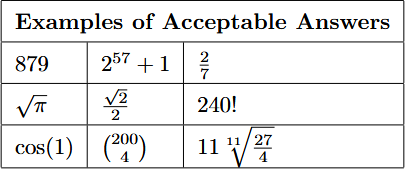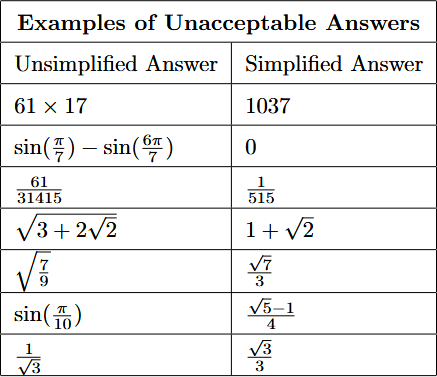TEAM SIZE: 3-4*
LOCATION: Fremont High School (Sunnyvale, California)
EARLY HORSE COST: $10 per participant (Register before March 17th, 2023 to receive the early horse price!)
NORMAL COST: $15 per participant (Register before April 19th, 2023 to participate)
CLICK HERE FOR REGISTRATION INSTRUCTIONS
*: Incomplete teams of 1-2 may be merged with other teams to make a full team of 3-4
Note for International Students: Students not in Canada or the United States should participate in the international version of our tournament being run by SIMCC. Email us at tournament@mustangmath.com if you're interested.
Note for Students in California: Students living within 50 miles of our in-person sites must participate in person. If you have an extenuating circumstance that would prevent this please send an email to tournament@mustangmath.com, and we'll grant you permission to participate online.
| Day | Start Time (PT) | Event |
|---|---|---|
| 4/24-4/29 | All Day | Problem of the Day |
| 4/29 | 8:30 AM-9:00 AM | Check-in |
| 4/29 | 9:00 AM-9:30 AM | Opening Ceremony & Contest Instructions |
| 4/29 | 9:30 AM-10:55 AM | Mounting Mayhem (75 minutes) |
| 4/29 | 10:55 AM-12:05 PM | Herding Hexes (60 minutes) |
| 4/29 | 12:05 PM-1:00 PM | Lunch Break (55 minutes) |
| 4/29 | 1:00 PM-1:55 PM | Mystery Mare (45 minutes) |
| 4/29 | 1:55 PM-3:20 PM | Gallop (60 minutes) |
| 4/29 | 3:20 PM-4:30 PM | Optional Activities |
| 4/29 | 4:30 PM | Awards Ceremony |
*Schedule subject to change. Note that there is built-in buffer time to explain instructions and assist with technical difficulties.*
Medals will be given to (at minimum) the members of the top 3 teams of each division, along with certificates of participation to all students and certificates of achievement to high-scoring teams. A wide variety of other prizes are available for top scoring teams, winners of activities, and a raffle including prizes from Wolfram, AoPS, and more!
General Rules
- No cheating - This contest has a zero-tolerance cheating policy. Any evidence of cheating may lead to immediate disqualification, or any other punishment deemed appropriate by competition staff.
- No calculators, rulers, compasses, protractors, or other aids are permitted.
- You may not use the Internet as a resource at any point during a test.
- In order to help enforce this, we may require individuals to provide a solution for a problem during the competition - so keep track of your work!
- The team divisions are determined by the highest grade level amongst the team members. Teams with 1 or more 8th graders will be in the Stallion division, teams with 7th graders and below will be in the Colt division, and teams with 6th graders and below will be in the Foal division. Teams may choose to compete in a higher division, if they’d like.
Answer Formatting Rules
- Carry out any reasonable calculations. For instance, you should evaluate any expressions which will take negligible time to evaluate (such as 1/2+1/3). You don't have to carry out unreasonable calculations, including large powers (e.g. 78), large factorials, large products, and trigonometric functions which cannot be expressed in terms of radicals.
- Write rational numbers in lowest terms. Decimals are also acceptable, provided they are exact.
- Move all square factors outside radicals. For example, write 3√7 instead of √63.
- Denominators need to be rationalized. For example, write 1/√2 as √2/2 instead.
- Do not express an answer using a repeated sum or product.
- Here are some examples of simplified answers, and examples of unsimplified answers with simplified equivalents:


Potential Topics Covered
Disclaimer: While most problems should fall within the scope of these topics, there may be a few that are not.
| Algebra |
|---|
|
| Combinatorics |
|---|
|
| Geometry |
|---|
|
| Number Theory |
|---|
|
ROUND 1: Mounting Mayhem (Puzzle)
- The Mounting Mayhem Round will consist of a series of progressively harder logic puzzles. Students will have 15 minutes to learn the rules and basic strategy of the puzzles, then 60 minutes to solve as many of them as possible.
- Puzzles often require out-of-the-box thinking although all topics can readily be understood and grasped by middle schoolers.
- Harder puzzles will be worth more points, but these puzzles will be longer and/or require more creativity — you must decide what problems to focus your time on to optimize your team score.
ROUND 2: Herding Hexes
- The “Herding Hexes” Round will consist of 26 questions to be solved in 45 minutes.
- The questions will be laid out on a grid of connected hexagons, with more difficult problems being located furthest from the center.
- Your score in the round will be determined by the problems you get correct, with bonus points available for having more correct answers connected within the grid!
- You are not necessarily expected to solve all the questions in this round within the allotted time. Instead, we encourage you to strategize how you might use your time to maximize your points!
ROUND 3: Mystery Mare
- The Mystery Mare round is exactly that — a mystery! The rules of the round will be revealed on competition day.
- Hints about the nature of the round may be revealed as the competition date nears.
ROUND 4: Gallop
- The Gallop Round will consist of 27 questions to be solved in 60 minutes.
- The questions will be divided into 9 sets of 3 questions each, and you must submit the answers to one set before accessing the problems for the next. This means you must strategize when to submit each set (incomplete or not) to ensure you get access to as many questions as possible.
- The problems will get progressively more difficult, and later problems will be worth more points.
- Submissions will be scored immediately and a live score of all participating teams will be available during the competition. Prepare for the adrenaline rush!
MMT has a unique take on standard math competitions2022 Participant
MMT focused less on calculations than other math competitions2022 Participant
I think this was a very nice way to spend my day.2021 Participant
MMT's style of problems are much better than other tournaments. Unlike other tournaments that has the same style over the years, MMT has new and exciting styles of problems that makes it more fun to try and solve it on the spot2022 Participant
MMT had people captivated even before the tournament started with their Discord server and problems of the day2022 Participant
I really appreciate all that MMT has done and I look forward to the competition that is held next year! I must say that the MMT was an impressive execution of math competitions unlike anything I've seen before!2022 Participant
My favorite memory from MMT was the teamwork - both chaotically and organizedly working with each other to solve the problems2022 Participant